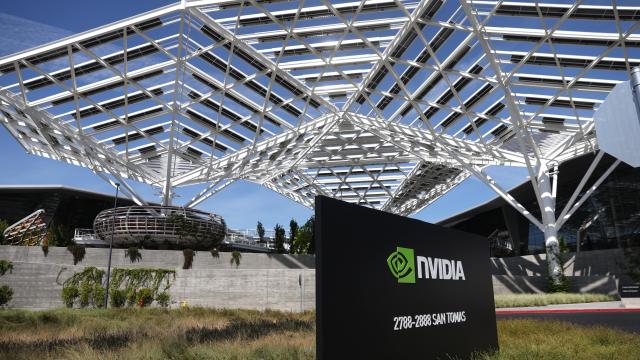U.S. officials are on a tear with their belated bid for chipmaking dominance. After passing a $US52 ($72) billion bill that aims to jumpstart American semiconductor manufacturing, officials are now restricting companies from exporting powerful GPUs to rivals like China and Russia.
Nvidia said in a Securities and Exchange Commission filing — revealed Wednesday — that the U.S. told the chip maker that it had to stop exporting any of its A100 series and upcoming H100 series GPUs to China and Russia. This restriction apparently includes any chip with capabilities on par with the A100 or A100X, and also impacts the company’s ability to develop its more advanced AI chips that were set for release later this year.
Apparently, the restrictions are meant to stop Chinese or Russian militaries from getting any use out of these chipsets. Nvidia noted it had already halted all sales in Russia this past March following the invasion of Ukraine. The company has said it will still be allowed to ship to other parts of the world via its centres in Hong Kong through September next year.
The company wrote that these new requirements on its U.S. government issued export licenses “may impact the company’s ability to complete its development of the H100 in a timely manner or support existing customers of the A100.” Nvidia added they were seeking exemptions, but that this might cause them to pull certain operations from China altogether. The company had been planning to make $US400 ($555) million in sales in China, according to the filing.
In an email statement sent to Gizmodo, Nvidia said:
“We are working with our customers in China to satisfy their planned or future purchases with alternative products and may seek licenses where replacements aren’t sufficient. The only current products that the new licensing requirement applies to are A100, H100 and systems such as DGX that include them.”
The U.S. is keeping a stern face, with a U.S. Department of Commerce spokesperson telling Reuters they want to “keep advanced technologies out of the wrong hands.” Officials are making an out-and-out break for semiconductor supremacy, recently passing the $US52 ($72) billion CHIPS+ Bill to in part increase manufacturing on home soil. Later reports also showed Washington was thinking about limiting exports of chipmaking tech over to China as well.
AMD, Nvidia’s main competitor, was also apparently hit with restrictions. The company did not immediately respond to Gizmodo’s request for comment, but a spokesperson told Reuters this will restrict the export of its MI250 AI-centered chips, though they claimed the MI100 chips are unaffected by the ban.
Nvidia’s H100 series is advertised as a massive boost for scaling artificial intelligence training. The H100 chip will also apparently be the backbone for the company’s upcoming combined CPU and GPU offering. The New York Times reported that the measures apparently impact high-end GPUs, and companies other than the two silicon valley giants have also been hit with notices that exports are being restricted.
China, of course, isn’t liking where this is going. A spokesperson for the commerce ministry Shu Jieting reportedly called this action a “tech blockade” during a Thursday press conference.
Former President Donald Trump had previously imposed bans on U.S. firms like Google, Intel, and Qualcomm from selling chips to China-based Huawei, and President Joe Biden has kept up a similar amount of pressure on other companies linked to the Chinese military.
Though of course this hasn’t done wonders for Nvidia, and their stock price fell pretty harshly late Wednesday. More importantly, however, Nvidia and other semiconductor manufacturers are dealing with a harsh reality that less and less basic users seem to be interested in their GPUS. Jon Peddie Research reported earlier this week that GPU shipments are down nearly 15% from last quarter, and that Nvidia’s shipments are down a whopping 25.7%. Sales are also down 33% year over year.
Nvidia has some pretty huge high-end GPUs on its slate, coming up for release which obviously aren’t part of new U.S. restrictions. However, the company’s most recent quarterly earnings report showed their revenue far below what they originally thought they’d have thanks to less interest in gaming cards from either gamers or those hoarding crypto miners. Though Nvidia has asked the U.S. to lay off its tit for tat with rivals like China, the ongoing chip shortage will likely prove an even bigger challenge overall.
